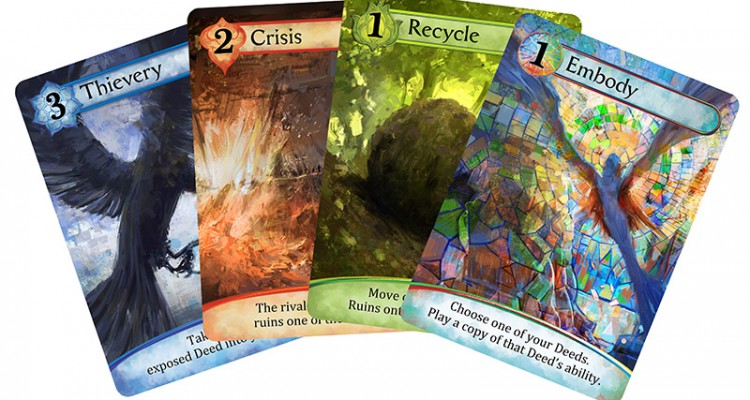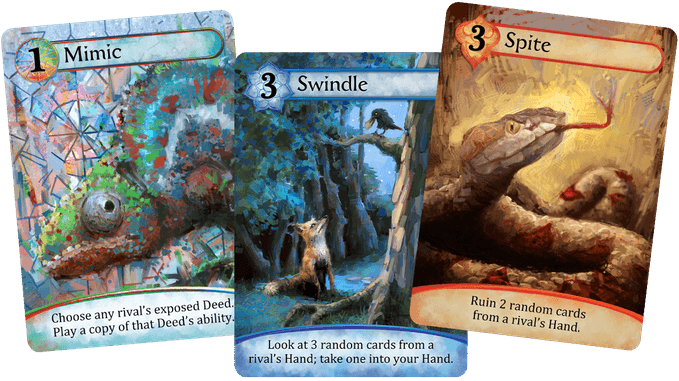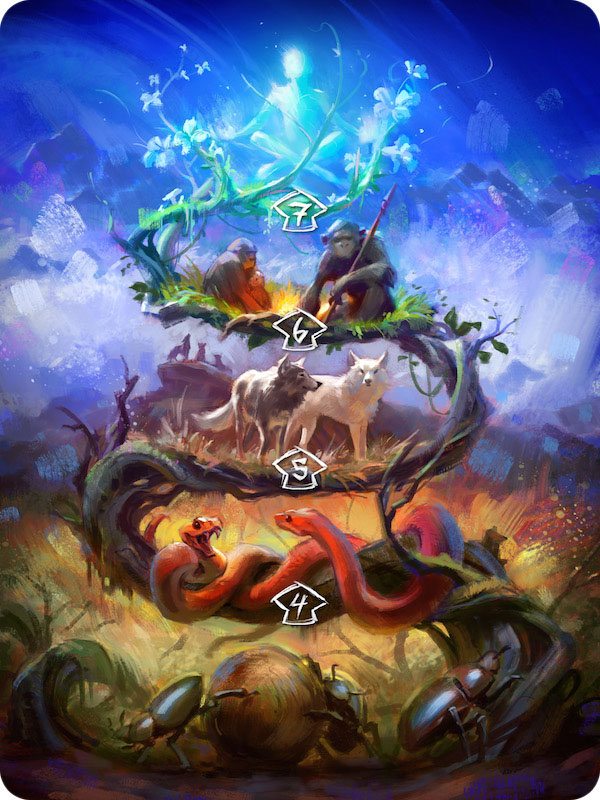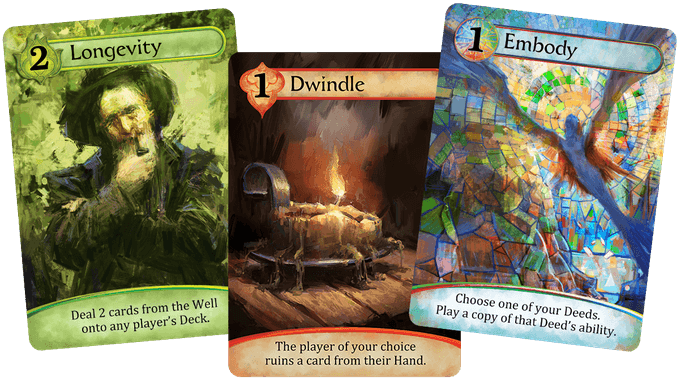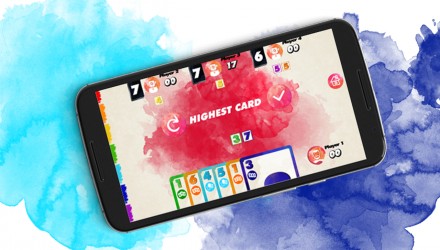Karmaka is a tactical card game from designers Eddy Boxerman and Dave Burke and published by Hemisphere Games. Here, you will be competing to ascend the karmic ladder while your deeds sow the seeds of your next life. But, as your mama always said, what goes around comes around, and your actions throughout the game will have consequences in this life… and the next!
In Karmaka, you start the game as a lowly dung beetle on your quest for Transcendence. You will be dealt an opening hand of cards and a starting deck, representing the course of your life. Cards in Karmaka convey one of three personality types through their color: red cards are nihilistic and destructive, allowing you to wreak havoc on your opponents good deeds; green cards are bountiful and swift, typically allowing you to draw or retrieve cards; and blue cards are wily and sly, enabling you to manipulate your cards or steal from an opponent. There is also a fourth type of card, called a Mosaic, which is considered to be a wild card. All of these cards have a value of between one and three points, and additionally has its own special ability.
The rules for the game are simple, but the decisions you will have to make throughout each life may not be. On your turn, you will draw a card from your personal deck, if able, and then play a card from your hand. Each card may be played in one of three ways:
- Face-up into your tableau of Deeds, for their value. Playing cards to your tableau is the only way you will be able to ascend the karmic ladder. These points will be tallied when you are reincarnated to determine if you qualify for the next rung.
- Face-up in the center of the table, for its ability. When you play a card this way, you may choose a target for the ability and then enact it. Be wary though, as any abilities that target your opponents also give them the opportunity to take that card for their own future use. What goes around certainly comes back around in this game!
- Face-down onto your Future Life pile, without revealing it. Your Future Life forms the basis of your starting hand when you reincarnate. This pile will be comprised of cards you have placed, as well as cards you have taken from opponents that have affected you.
Throughout the game you and your opponents alike will find their current life ending, forcing a reincarnation to the next; this occurs when you begin your turn with an empty hand and an empty personal deck. Instead of taking a normal turn, you must find the type of Deeds you have played with the highest total value, and compare that score against the next rung of the karmic ladder. Each step along this path has a sequentially higher value which must be attained in order to advance, and if the threshold is met, you will take the next step on your journey toward Transcendence. If you were unable to reach the required level, you will instead receive a karmic ring which will count as one point towards your next reincarnation score (a little good will for trying). After scoring, all of the cards in your tableau will be discarded, and you must draw the cards from your Future Life pile. These cards will be your new hand for the next life. If the total number of cards in your Future Life was less than six, the remainder are drawn from the Well into your personal deck.
Play continues in this manner until one player has reached Transcendence (the last rung on the karmic ladder) and is named the winner.
Good Karma?
One of the most interesting elements of the game is derived from the format of the multi-use cards. The ability to play these cards for points, abilities or for a future benefit presents an enjoyable blend of tactical and strategic decisions. Determining how to accomplish your own goals while still keeping the actions of your opponents in check opens up a number of avenues to explore. I personally found building your future life to be an intriguing twist on the usual take of drafting cards to build your deck. While your opening cards are random, playing to your future life gives you the ability to stash cards in the hopes of fine tuning the focus of your next life.
I am not a huge fan of highly interactive “take-that” games, mainly due to the players usually having no sense of what’s coming next and being unable to plan accordingly; so, needless to say, the player interaction was a worry of mine at first. I was, however, pleasantly surprised and genuinely impressed with the innovative nature in which player interaction is handled in Karmaka. The designers have utilized the principles of karma, quite literally, and created a true “what goes around comes around” system. When targeting an opponent you must weigh the benefit, not only in the moment, but in the future to determine whether it’s worth following through knowing that the same card could possibly come back to hurt you in a future turn. It really is a unique and intriguing decision point. All that said, the game can also play out in a passive manner depending on each player’s focus. This helps the game cater to a wider variety of gamers.
While the game works with two players, I’ve experienced the most enjoyment in playing with three or four players where the interaction is more prevalent and varied. The game does tend to stall slightly at these higher player counts, though, when everyone reaches the second to last rung while struggling to amass points in their tableau and still striving to fend off the advances of their opponents. While a king-making situation could rear its ugly head in certain circumstances, I’ve found that proper planning of your future life will likely win out in the end.
Finally, you probably don’t need to read this preview to know that the artwork in this game is stunning. Seriously, look at it! The vibrant painterly quality of each illustration portrays a fictional aura of Transcendence that only helps to immerse you in the game play.
Karmaka is a beautiful meld of familiar mechanics and refreshing innovation. Simple to learn, yet hard to master, this card game will present a new challenge each and every game. I definitely recommend you check out Karmaka, or it may just come back to haunt you.
League Rulings
Steve
First Impression: I was able to play Karmaka with four players and I had a lot of fun with it. At first it seems like your basic “draw a card, play a card” type of game, but the decisions get increasingly interesting as the game progresses. Playing a card for its abilities in an aggressive fashion can really come back to bite you since your opponent has the option to place that card in their future life deck. This mechanic stands out the most for me, and offers a new way of dealing with “take that” gameplay. I really enjoyed the artwork, the theme, and the playing time hits the sweet spot.
Matt
I’ve only played Karmaka a single time, but I enjoyed the experience. In particular, I found the give-and-take of the card play to provide a wonderful check to the “take-that” interaction. It works to force contemplation and consideration before acting out against your opponents – very thematic, indeed! I also was fond of the multi-use cards, especially the “future life” planning, where you will essentially draft a toolkit for future rounds. It, again, keeps you engaged and constantly evaluating the impact of your choices, as you work toward optimizing and timing each play. As Dan mentioned above, there was a definite stall when we reincarnated as wolves and apes. It wasn’t completely egregious, but we spent a noticeable amount of time battling to accrue enough points to advance past those stages. This helped to keep the race tight, though, and can probably be considered a boon overall. I’m looking forward to working my way back up the ladder in Karmaka. The title provides quick, innovative gameplay that is easy on the eyes and wonderfully thematic.
The League of Nonsensical Gamers would like to thank Hemisphere Games for kindly providing us with a copy of Karmaka for this preview.
Karmaka is currently funding over on Kickstarter. Head on over to the campaign page to purchase your own copy. For $25 you will receive a full copy of the game and all stretch goals.

